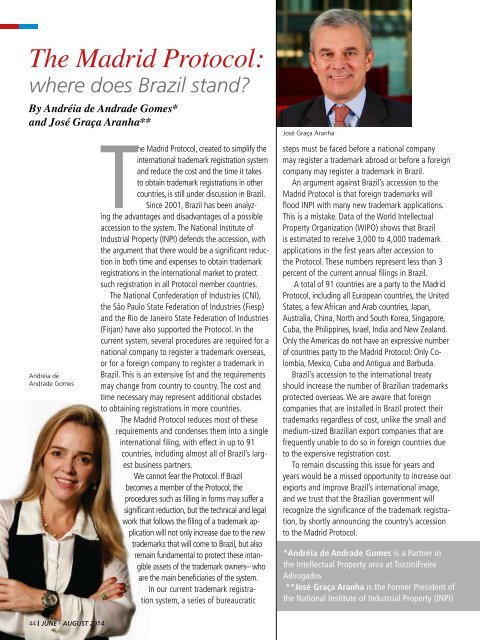Nordic-Light-Jun2014-Aug2014
Nordic-Light-Jun2014-Aug2014
Nordic-Light-Jun2014-Aug2014
Create successful ePaper yourself
Turn your PDF publications into a flip-book with our unique Google optimized e-Paper software.
The Madrid Protocol:<br />
where does Brazil stand<br />
By Andréia de Andrade Gomes*<br />
and José Graça Aranha**<br />
José Graça Aranha<br />
Andréia de<br />
Andrade Gomes<br />
The Madrid Protocol, created to simplify the<br />
international trademark registration system<br />
and reduce the cost and the time it takes<br />
to obtain trademark registrations in other<br />
countries, is still under discussion in Brazil.<br />
Since 2001, Brazil has been analyzing<br />
the advantages and disadvantages of a possible<br />
accession to the system. The National Institute of<br />
Industrial Property (INPI) defends the accession, with<br />
the argument that there would be a significant reduction<br />
in both time and expenses to obtain trademark<br />
registrations in the international market to protect<br />
such registration in all Protocol member countries.<br />
The National Confederation of Industries (CNI),<br />
the São Paulo State Federation of Industries (Fiesp)<br />
and the Rio de Janeiro State Federation of Industries<br />
(Firjan) have also supported the Protocol. In the<br />
current system, several procedures are required for a<br />
national company to register a trademark overseas,<br />
or for a foreign company to register a trademark in<br />
Brazil. This is an extensive list and the requirements<br />
may change from country to country. The cost and<br />
time necessary may represent additional obstacles<br />
to obtaining registrations in more countries.<br />
The Madrid Protocol reduces most of these<br />
requirements and condenses them into a single<br />
international filing, with effect in up to 91<br />
countries, including almost all of Brazil’s largest<br />
business partners.<br />
We cannot fear the Protocol. If Brazil<br />
becomes a member of the Protocol, the<br />
procedures such as filling in forms may suffer a<br />
significant reduction, but the technical and legal<br />
work that follows the filing of a trademark application<br />
will not only increase due to the new<br />
trademarks that will come to Brazil, but also<br />
remain fundamental to protect these intangible<br />
assets of the trademark owners– who<br />
are the main beneficiaries of the system.<br />
In our current trademark registration<br />
system, a series of bureaucratic<br />
steps must be faced before a national company<br />
may register a trademark abroad or before a foreign<br />
company may register a trademark in Brazil.<br />
An argument against Brazil’s accession to the<br />
Madrid Protocol is that foreign trademarks will<br />
flood INPI with many new trademark applications.<br />
This is a mistake. Data of the World Intellectual<br />
Property Organization (WIPO) shows that Brazil<br />
is estimated to receive 3,000 to 4,000 trademark<br />
applications in the first years after accession to<br />
the Protocol. These numbers represent less than 3<br />
percent of the current annual filings in Brazil.<br />
A total of 91 countries are a party to the Madrid<br />
Protocol, including all European countries, the United<br />
States, a few African and Arab countries, Japan,<br />
Australia, China, North and South Korea, Singapore,<br />
Cuba, the Philippines, Israel, India and New Zealand.<br />
Only the Americas do not have an expressive number<br />
of countries party to the Madrid Protocol: Only Colombia,<br />
Mexico, Cuba and Antigua and Barbuda.<br />
Brazil’s accession to the international treaty<br />
should increase the number of Brazilian trademarks<br />
protected overseas. We are aware that foreign<br />
companies that are installed in Brazil protect their<br />
trademarks regardless of cost, unlike the small and<br />
medium-sized Brazilian export companies that are<br />
frequently unable to do so in foreign countries due<br />
to the expensive registration cost.<br />
To remain discussing this issue for years and<br />
years would be a missed opportunity to increase our<br />
exports and improve Brazil’s international image,<br />
and we trust that the Brazilian government will<br />
recognize the significance of the trademark registration,<br />
by shortly announcing the country’s accession<br />
to the Madrid Protocol.<br />
*Andréia de Andrade Gomes is a Partner in<br />
the Intellectual Property area at TozziniFreire<br />
Advogados<br />
**José Graça Aranha is the Former President of<br />
the National Institute of Industrial Property (INPI)<br />
44 JUNE - AUGUST 2014


